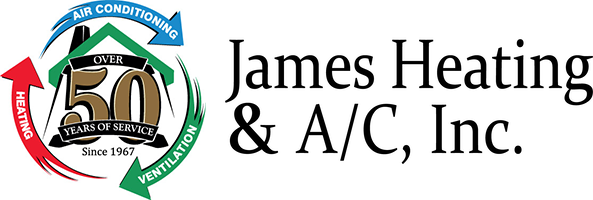
If you’re uncertain whether your Lexington home has bad indoor air quality (IAQ), it likely does.
We are indoors a lot. In fact, we’re indoors up to 90% of the time, according to the U.S. Environmental Protection Agency. And the air inside houses could be 2–5 times worse than outdoors, which may create long-term health problems.
Most Common Sources of Poor IAQ
We’ve compiled a list of the most common sources of inferior IAQ, the problems they cause and how you can take care of these indoor air pollutants. If you’re troubled by the air inside your home, we advise talking with a professional like James Heating & A/C, Inc about which solutions are best for your home.
Volatile Organic Compounds
Volatile organic compounds, or VOCs, are chemicals emitted from common household products.
They’re found in paint and stains as well as:
- Furniture
- Carpet
- Building materials
- Cleaning products
- Cosmetics
- Air fresheners
- Candles
When these chemicals accumulate indoors, they can irritate your eyes, nose and throat. They may also create headaches and nausea. Regardless of whether your house is in a rural or industrial location, an EPA study found indoor levels of these fumes can be 2–5 times worse than the air outdoors.
Always use the manufacturer’s directions when applying paint or spraying cleaning products. Cracking a window can help chemicals disappear faster.
Air purification systems can also make it better. This system partners with your heating and cooling unit to enhance indoor air. When hunting for a model, ensure it’s specifically created to wipe out VOCs.
Dust and Pet Dander
Dust and pet dander can irritate health problems like asthma and allergies, especially when it continuously gets recirculated by your residence’s comfort system. While you can vacuum more regularly and install an improved air filter, an air filtration system may be a better match.
This unit hooks to your comfort equipment to deliver powerful filtration. Some kinds provide hospital-level filtration for removing particles and bioaerosols.
Lasting Odors
New homes are securely sealed to boost energy efficiency. While this is good for your heating and cooling expenses, it’s not ideal for your IAQ.
Stale odors can stick around for a greater amount of time since your home is pulling in a smaller amount of fresh air. Since keeping your windows open all the time isn’t a possibility, here are two ways you can make your indoor air smell fresher.
An air purification system is put in your HVAC system to eliminate odors before they are redistributed. Search for one with a carbon filter and the power to wipe out dangerous VOCs. These systems can also help keep your household healthy by wiping out most bacteria and ordinary allergy triggers like pollen and mold spores.
A ventilation system removes musty indoor air and exchanges it with clean outdoor air. There are two models of equipment (heat recovery and energy recovery), so call our professionals for more info on which type is right for your residence.
Unbalanced Humidity
It’s important your house’s humidity keeps even. Air that’s too humid can lead to mold, while dry air can create respiratory issues.
Our specialists suggest 40–50% for top comfort. To keep yours even, think over getting a whole-home humidifier or whole-home dehumidifier with your HVAC equipment.
In place of having to lug a humidifier from room to room, this solution delivers balanced humidity around your house.
Carbon Monoxide
Carbon monoxide is colorless gas you can’t smell. It’s caused by insufficient combustion in fuel-burning appliances, like gas heating systems, water heaters or fireplaces.
It produces an extreme health risk. In little levels, it can lead to flu-like sickness like headaches and nausea. It may be fatal in large amounts.
We recommend annual furnace maintenance to ensure your unit is running smoothly. This work allows our specialists to pinpoint issues before they start, including malfunctions that can cause carbon monoxide leaks.
The best approach to keep your residence free of carbon monoxide is to get detectors. These alarms need to be on all floors close to bedrooms and living spaces.
Enhance Your Home’s Air Quality with the James Heating & A/C, Inc Professionals
Informed that your home has inferior air quality but not sure how to improve it? Or unsure which product is a good fit for you? Give our kind HVAC experts a call at 336-853-6070 or contact us online right away. With free estimates and professional support, we’ll help you locate the ideal option for your family and budget.

